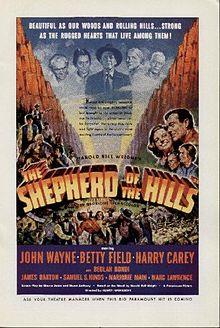| The Shepherd of the Hills | |
|---|---|
 Film poster | |
| Directed by | Henry Hathaway |
| Produced by | Jack Moss |
| Screenplay by |
|
| Based on | The Shepherd of the Hills 1907 novel by Harold Bell Wright |
| Starring |
|
| Music by | Gerard Carbonara |
| Cinematography |
|
| Edited by | Ellsworth Hoagland |
Production company | Paramount Pictures |
| Distributed by | Paramount Pictures |
Release date |
|
Running time | 98 minutes |
| Country | United States |
| Language | English |
The Shepherd of the Hills is a 1941 American drama film starring John Wayne, Betty Field and Harry Carey.[1] The supporting cast includes Beulah Bondi, Ward Bond, Marjorie Main and John Qualen. The picture was Wayne's first film in Technicolor and was based on the novel of the same name by Harold Bell Wright. The director was Henry Hathaway, who directed several other Wayne films including True Grit almost three decades later.
The story was filmed previously in the silent era by author Wright himself in 1919, released on State Rights basis. It was filmed again, in The Shepherd of the Hills (1928 film), starring Molly O'Day at First National Pictures. Again remade as 1964, also color version.
The film also prominently features two uncredited pieces of music. The first is used as a leit motif to represent the spirit of Young Matt's deceased mother: the Wiegenlied ("Guten Abend, gut' Nacht" [1868]) of Johannes Brahms, commonly known in English as the Brahms Lullaby. The second uncredited composition was "There's A Happy Hunting Ground," words and music copyrighted by Sam Coslow, sung by "Fuzzy" Knight, accompanied by an a cappella onscreen chorus in multi-voiced harmony; the song is sung again by the chorus alone over the closing credits.
Cast
- John Wayne as Young Matt
- Betty Field as Sammy Lane
- Harry Carey as Daniel Howitt
- Beulah Bondi as Aunt Mollie
- James Barton as Old Matt
- Samuel S. Hinds as Andy Beeler
- Marjorie Main as Granny Becky
- Ward Bond as Wash Gibbs
- Marc Lawrence as Pete
- John Qualen as Coot Royal
- Fuzzy Knight as Mr. Palestrom
- Tom Fadden as Jim Lane
- Olin Howland as Corky
- Dorothy Adams as Elvy
- Virita Campbell as Baby
- Selmer Jackson as Doctor (uncredited)
Production
Filming took place in Big Bear Lake and Moon Ridge, California.[2]
Differences from the novel
While the novel interposed fiction with portrayals of actual persons residing in the Missouri Ozarks, in the early Branson area, the film departed markedly from the book's presentations. Old Matt, a patriarch, mill owner and influential person within the community, is presented in the film as a doddering fool, henpecked by his wife, Aunt Mollie. In the novel she's a nurturing, kindly, loyal wife and friend, but in this film she is a shrill, nasty moonshiner. The "Shepherd" of the title, a cultured, sympathetic visitor from Chicago who contributes positively to the society he's visiting, in this film is an aging gunfighter with a guarded past and, in total odds with the book, is here Young Matt's (John Wayne's) messianic father, with a shootout perpetrated by "Big John." Other characters differ as markedly from Wright's novel.
See also
- John Wayne filmography
References
- ^ "The Shepherd of the Hills". New York Times. Retrieved September 28, 2016.
- ^ "The Shepherd of the Hills". AFI Catalog of Feature Films. Los Angeles, California: American Film Institute. Retrieved April 5, 2020.
External links
- The Shepherd of the Hills at IMDb
- The Shepherd of the Hills at the TCM Movie Database
- The Shepherd of the Hills at AllMovie
- The Shepherd of the Hills at the American Film Institute Catalog
- The Shepherd of the Hills at Rotten Tomatoes